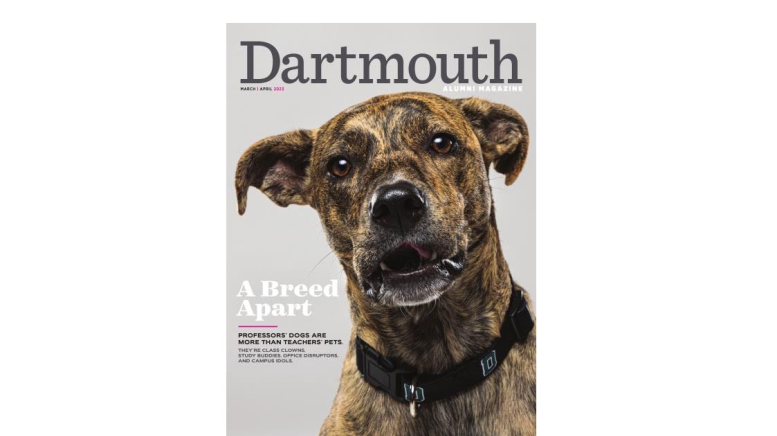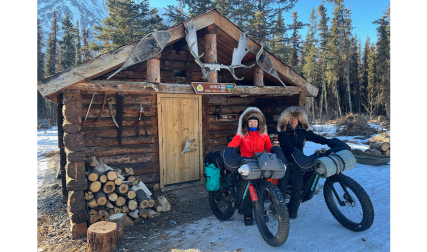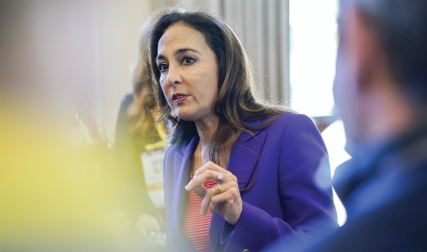Puppy Love
I enjoyed the articles about the Hanover dogs [“A Breed Apart,” March/April]. They reminded me of a large setter we called Snowball—his real name was Fritz. We would throw a snowball at a snowbank, and he would dig to find it. He never succeeded! One spring I regularly played six holes of golf before my 9 a.m. class, and Snowball showed up to retrieve my golf ball and dared me to take it from him. I gave up, left the ball for him, and pedaled off to class without it. Another time, my room-mate put a dog in our room as a joke when I had a late morning class. The dog ate my sociology textbook. I didn’t like that class anyway. I guess the town still has lots of dogs around. A town without a pet is missing an element of pleasure.
Jerry Greenfield ’61, Th’62, Tu’65
Richland, Washington
The stories of dogs on campus put me in mind of my own campus dogs back in the day. As a freshman living in a dorm in 1968, my friends and I just had to adopt a puppy. With our newly minted radical poses, we named him Che.
Of course, keeping a dog in a dorm was against all kinds of rules, but nevertheless we managed to keep him for months. Even the dorm custodian cooperated. When I asked him carefully if he was going to report us, he allowed as how dogs were certainly illegal in dorms, but quickly added “But that little #!&*# could run right between my legs and I’d never see him!”
Eventually, we had to give Che up and he was adopted by a fraternity, becoming a campus fixture for several years. He was most famous for his ability to beg or steal food from the dining hall, capable of snatching a donut or a pork chop from shoulder height in a single bound. He was skittish around people in uniform (wonder where that came from?) and to my knowledge he was never apprehended.
After that, I remained dog-less until my senior year. Living far off-campus, I adopted the dog I would have for another 12 years. As my sensibilities had changed a bit since freshman year, I named him Zappa. He rode with me on my commute and sometimes came to class. That ended right after he attended a senior bio seminar and jumped up and licked the balding head of the department chair. Zappa stayed in the car from then on.
Here’s to always having dogs on campus, in class or out.
Don Meals ’72
Burlington, Vermont
What a concept! Glorious photographs! And what a joy to read! Don’t we all need some kind pleasure that we know exists simply from pure love. Dogs are indeed all our best friends—even if we do not know them. The simple notion of a dog brings joy and promise. Each photograph of these precious pets was so uplifting. One need not know the dogs to feel their loving presence. What a glorious way to start my day!
Marianne Hraibi, Adv’08
Saint Johnsbury, Vermont
I read “A Breed Apart” with great interest. Unfortunately, you omitted the greatest of all dogs at Dartmouth—one who actually received a diploma from the College on June 17, 1951. My classmate Ted Glaser ’51 had Seeing Eye dogs all four years at Dartmouth. Unfortunately, I do not remember their names. But when Ted got his diploma, so did his dog.
Herb Knight ’51, Tu’52
Saint Charles, Illinois
Very much enjoyed your piece on Dartmouth’s dogs. Hope there will soon be a follow-on piece about the College’s cats!
Jack Spellman ’80
Austin, Texas
The wonderful article on campus dogs brought back memories of the bulldog that kept Professor John Finch company in his office in Bartlett Hall in the 1970s. Finch joined the Dartmouth faculty in 1939 and helped found the drama department in the 1960s.
In a fine tribute by Robert B. Graham in the April 1973 issue of the DAM, Professor Finch expressed admiration for his students, finding their combination of “independence and naivete” refreshing. The undergraduates of the time were not necessarily smarter, he said, but he found their willingness to challenge the current culture “particularly exciting.”
Professor Finch was not thinking of me. I took his theater writing course and wrote a dreadful play. I remember the loyal dog that lay at his feet better than my awkward scribblings.
Carl Little ’76
Mount Desert, Maine
My wife and I greatly enjoyed "A Breed Apart," both pictures and stories. I would humbly add these remembrances. Legendary rowing coach Peter Gardner had a black Lab who loved to chase sticks. I believe it was spring of 1963, and the ice had just gone off the Connecticut River. A few of us oarsmen on the dock took turns throwing a solid stick into the river. The Lab immediately leapt into the water and captured the stick. He or she always intercepted its target despite a 4- to 6-mile per hour current. It did not matter if we threw up or down stream, the Lab always accounted for the current and was on target with a laser straight swim.
Coach had to ask us to stop as the dog would have continued until its death.
The second memory is of the free roaming dogs in Thayer Dining Hall. The story was that an alum had subsidized the free milk stations on the condition that dogs be allowed in Thayer. We enjoyed their company as well as the unlimited supply of whole and skim milk. That lasted all my four years.
Don Ries ’66
Tucson, Arizona
Bad Dog
I have no idea who decided the feature article in the March/April edition should be about dogs, but the editor should have had the sense to know better. Methinks it may be time to get a different editor.
P.R. Schenck ’54
Wilmington, North Carolina
I’m disappointed with DAM’s stories, including the latest issue about professors’ dogs. I love dogs, but dogs and humans alike are now endangered by nuclear war.
With World War III at the threshold, it’s extremely troubling that the magazine buries its head in the sand and churns up articles that effectively deny the seriousness of this situation. It’s not that we can’t have articles about sports and Hollywood, but the magazine seems to be deliberately running away from an extremely serious issue.
Why not have an in-depth series featuring a range of perspectives on the Ukraine crisis? Why not take advantage of the intelligence of alumni to take leadership steps forward in paving the way for cooperative dialogue both among Americans and between the United States and Russia? Let’s be examples of open-mindedness and push past the prejudiced rivalry that limits our potential for peace and justice.
Kristin Young Christman ’90
Clifton Park, New York
Unknown Hero
I was deeply touched by Deron Snyder’s article profiling the great civil rights leader, Lester B. Granger, class of 1918 [“Underappreciated Giant,” March/April].
I must confess that I had not fully fathomed Granger’s pioneering contribution to the civil rights movement when I received the Lester B. Granger ’18 Award for Life-time Achievement in 2009. As I got the Granger Award simultaneously with the Martin Luther King Jr. Social Justice Award, there had been much more publicity about the latter. I now wish I had known and more fully appreciated that MLK’s towering achievement was built on the foundation of Granger’s exemplary leadership in ending systemic racial segregation in the citadel of the powerful U.S. Navy and boldly challenging the nefarious legacy of Jim Crow in an earlier era during much tougher times.
When the names of two great leaders are juxtaposed, there is a risk of one of them being overshadowed by the aura of the more high-profile contemporary leader. But we must never forget that most great leaders stand on the shoulders of their giant predecessors.
Kul Chandra Gautam ’72
Irvine, California
I so appreciated your article about Lester B. Granger. There are so many Black heroes and patriots who have been largely forgotten and their stories and legacies deserve to be uplifted. We have so much to learn from their courage and accomplishments.
I am several years into producing a documentary about the athlete, actor, producer, and civil rights activist Canada Lee, another brilliant American hero who has been forgotten. I wonder if Granger and Lee ever met each other while working toward integrated armed forces. I imagine they did, and as we continue our research, I hope to find proof.
Jonathan Skurnik ’86
South Pasadena, California
Right On!
I loved the even-handed assessment of current campus culture by Peter Slovenski ’79 [“Mutual Respect” Web Extras, November/December 2022]. My sense is that DAM and the College are becoming increasingly intolerant of conservatives’ viewpoints, so it was great to see some intellectual diversity.
Lex McCusker ’74
Washington, D.C.
Perseverance
Regarding “Long Time Coming” [March/April], I took a phycology (study of algae) class with Hannah Croasdale in the early ’70s, choosing the class for its open-air aspect. My most vivid visual memory of any professor is of her clambering over rocks and through water, even though she relied upon a walking stick. One could sense her resolute strength and deep respect for the pursuit of science within a calm, authoritative presence.
I suspected that she must have endured some trials before I came to campus, since it was often inhospitable or even hostile to women, but I did not know the extent or the longevity of her mistreatment.
Craig Feathers ’76
Northfield, Minnesota
Bring Back Bison
Tony Koessler ’62 was incensed to read of plans by Ali Fox ’02 [“A Wild Idea,” November/December 2022] to encourage the plains bison [“Letters,” March/April]. He wonders if her supporters would like “to see the cowboy become extinct.” Yes, sir! The beef industry in the U.S. is an artificial construction of 19th-century London investors, fostering an animal not suited for this continent, still consuming too much water, feed, antibiotics, and our damn taxes in subsidies to hide these costs. I heartily enjoy meat four meals a week, two breakfasts that include fish, and two with ground buffalo, the tasty and healthier-than-beef animals who thrive on the natural grasses of our land.
Mike Mosher ’77
Bay City, Michigan
That Was Then
I fail to understand Sarah Hartwell’s surprise at President Hopkins’ condemnation of the farmhouse at Beaver Meadow in 1925 [“The Beaver Meadow Affair,” January/February]. Hopkins was a man of his time. And so were the faculty and student body of the College. Even the fraternity’s members themselves called for the resignation of their leaders.
Homosexuality was considered either immoral or an illness. People believed men could be seduced against their will. There was widespread confusion about the association of effeminacy, an interest in the arts, cross-dressing, and sexual orientation. Actually, these beliefs and attitudes of the 1920s were not so different from those of my time at Dartmouth in the 1960s.
Enlightenment is recent. So that now—fortunately—if Hopkins’ statements were made by the current president, this would truly be surprising.
Michael Quadland ’65
Morris, Connecticut
Second Campus?
Dartmouth’s tremendous sense of community and loyalty are among its great strengths, which have been built and nurtured over 253 years with one overriding identity—Dartmouth—and one beautiful small, intimate campus.
In 2016, however, someone decided that our small College needed to be carved up into “houses,” complete with new names, crests, colors (other than Green), and meeting houses, a puzzling and unnecessary Balkanization of our College.
Now the administration has won approval from the town to build a new campus almost 2 miles from the Green, starting with 400-student dorms and dining facilities. The argument for further splitting up the College seems to be that we need to renovate old dorms and, to accommodate their temporary closure, spend millions of dollars on new dorms from which students will have to be bused to campus. The logic escapes me, as it apparently did the faculty, which voted against the idea 89-4 in February 2022.
Carving up the undergraduate population into houses and building a second campus will fundamentally change the character of our college. We have a great model that builds cohesiveness and loyalty through the intimacy of on-campus living and studying. Why is the administration changing that amazingly successful model? I hope our new president will reconsider these moves.
Jim Bullion ’78, Tu’82
Hanover, New Hampshire




